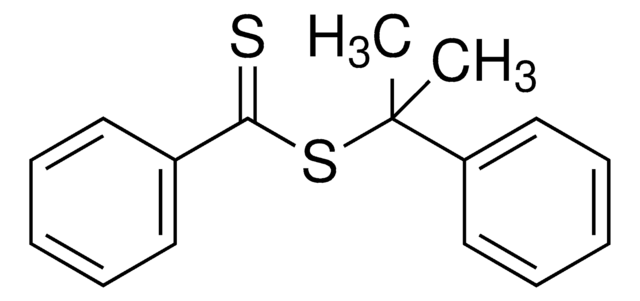740497
Methyl-2-(dodecylthiocarbonothioylthio)-2-Methylpropionat
97% (HPLC)
Synonym(e):
2-[[(Dodecylthio)thioxomethyl]thio]-2-methylpropanoic acid methyl ester
About This Item
Empfohlene Produkte
Qualitätsniveau
Assay
97% (HPLC)
Form
liquid
Brechungsindex
n20/D 1.517
Dichte
1.008 g/mL at 25 °C
Lagertemp.
2-8°C
SMILES String
CCCCCCCCCCCCSC(=S)SC(C)(C)C(=O)OC
InChI
1S/C18H34O2S3/c1-5-6-7-8-9-10-11-12-13-14-15-22-17(21)23-18(2,3)16(19)20-4/h5-15H2,1-4H3
InChIKey
NHWLEOYMZVCNBC-UHFFFAOYSA-N
Verwandte Kategorien
Allgemeine Beschreibung
Anwendung
Signalwort
Warning
Gefahreneinstufungen
Acute Tox. 4 Oral - Eye Irrit. 2 - Flam. Liq. 3 - Skin Irrit. 2 - STOT SE 3
Zielorgane
Respiratory system
Lagerklassenschlüssel
3 - Flammable liquids
WGK
WGK 3
Flammpunkt (°F)
140.0 °F
Flammpunkt (°C)
60 °C
Analysenzertifikate (COA)
Suchen Sie nach Analysenzertifikate (COA), indem Sie die Lot-/Chargennummer des Produkts eingeben. Lot- und Chargennummern sind auf dem Produktetikett hinter den Wörtern ‘Lot’ oder ‘Batch’ (Lot oder Charge) zu finden.
Besitzen Sie dieses Produkt bereits?
In der Dokumentenbibliothek finden Sie die Dokumentation zu den Produkten, die Sie kürzlich erworben haben.
Kunden haben sich ebenfalls angesehen
Artikel
A series of polymerization were carried out using RAFT agents and monomers yielding well-defined polymers with narrow molecular weight distributions. The process allows radical-initiated growing polymer chains to degeneratively transfer reactivity from one to another through the use of key functional groups (dithioesters, trithiocarbonates, xanthates and dithiocarbamates). RAFT agents help to minimize out-of-control growth and prevent unwanted termination events from occurring, effectively controlling polymer properties like molecular weight and polydispersity. RAFT agents are commercially available. RAFT does not use any cytotoxic heavy metal components (unlike ATRP).
The modification of biomacromolecules, such as peptides and proteins, through the attachment of synthetic polymers has led to a new family of highly advanced biomaterials with enhanced properties.
We presents an article about a micro review of reversible addition/fragmentation chain transfer (RAFT) polymerization. RAFT (Reversible Addition/Fragmentation Chain Transfer) polymerization is a reversible deactivation radical polymerization (RDRP) and one of the more versatile methods for providing living characteristics to radical polymerization.
Tools for Performing ATRP
Protokolle
We presents an article featuring procedures that describe polymerization of methyl methacrylate and vinyl acetate homopolymers and a block copolymer as performed by researchers at CSIRO.
Sigma-Aldrich presents an article about RAFT, or Reversible Addition/Fragmentation Chain Transfer, which is a form of living radical polymerization.
Sigma-Aldrich presents an article about the typical procedures for polymerizing via ATRP, which demonstrates that in the following two procedures describe two ATRP polymerization reactions as performed by Prof. Dave Hadddleton′s research group at the University of Warwick.
Unser Team von Wissenschaftlern verfügt über Erfahrung in allen Forschungsbereichen einschließlich Life Science, Materialwissenschaften, chemischer Synthese, Chromatographie, Analytik und vielen mehr..
Setzen Sie sich mit dem technischen Dienst in Verbindung.![4-Cyano-4-[(Dodecylsulfanylthiocarbonyl)sulfanyl]pentansäure 97% (HPLC)](/deepweb/assets/sigmaaldrich/product/structures/204/925/30ae6ca0-5b0b-4963-a061-7e5e3d1a85af/640/30ae6ca0-5b0b-4963-a061-7e5e3d1a85af.png)


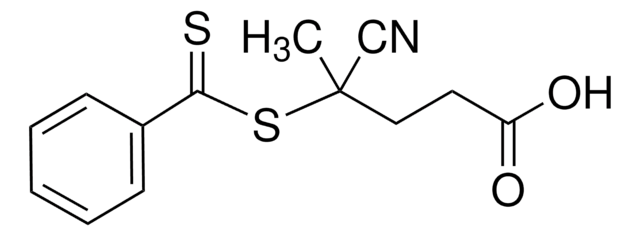

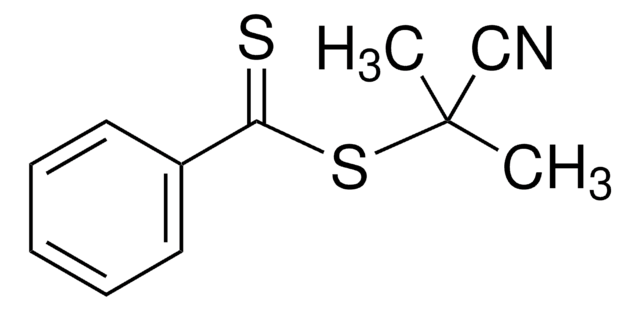


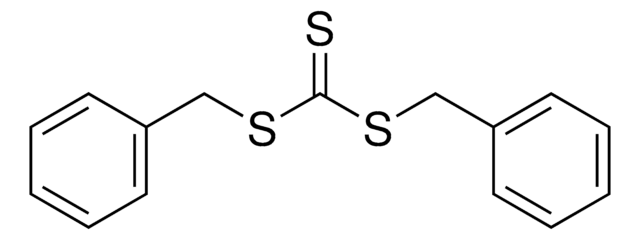
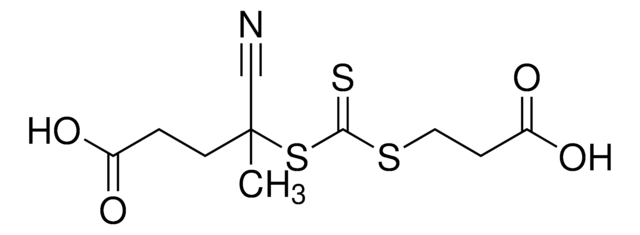


![2-[[(2-Carboxyethyl)sulfanylthiocarbonyl]-sulfanyl]propanoic acid](/deepweb/assets/sigmaaldrich/product/structures/427/606/b02310e2-102e-4324-b09d-e4c0de4fab2c/640/b02310e2-102e-4324-b09d-e4c0de4fab2c.png)
![1,1,1-Tris[(dodecylthiocarbonothioylthio)-2-methylpropionate]ethane 98% (HPLC)](/deepweb/assets/sigmaaldrich/product/structures/233/882/e9f09ad0-62a9-4bbe-b7c0-98b721824fa7/640/e9f09ad0-62a9-4bbe-b7c0-98b721824fa7.png)

